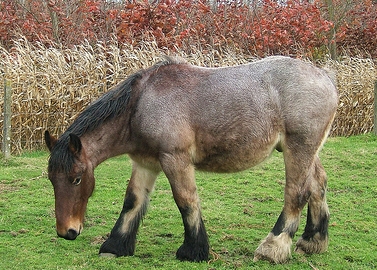Protein provides amino acids for the body which give energy to build and repair bones, muscles and soft tissue. Excluding fat and moisture, amino acids are about 80% of a horse’s makeup.
Young horses in the growing stage require more protein in their diets than full grown horses. Pregnant and lactating mares also require more protein.
When a horse consumes protein, the amino acids are absorbed through the small intestine’s wall, entering the bloodstream through the liver. They then move to areas where needed for growth or repair of tissue. Two of the amino acids, Lysine and Methionine, are essential to the horse’s use of the other amino acids.
Excesses and deficiencies of protein can lead to poor health.
Deficiencies can occur when a horse is on a too low protein diet for an extended period of time. This can lead to problems such as under-development in the young horse, weight and energy reduction in all horses, abortion and milk reduction in pregnant and lactating mares. A diet with the correct amount of protein for the adult horse can reverse these signs. Damage to young horses deprived of the right proportion of protein for a long time is sometimes irreversible.
Excess protein will turn into ammonia and urea. It is then filtered through the blood and excreted in the urine, leaving a strong odor. This can eventually lead to kidney problems.
Young horses fed excess protein may run the risk of bone and joint issues and slower growth rates. Adult horses can have lowered calcium absorption while youngsters can have lowered calcium and phosphorus absorption.
The amount of protein necessary depends on the individual horse – age, breeding season, whether pregnant or lactation, a need for increased muscle mass.
Since protein needs can be different for each horse, check with your vet or an animal nutritionist to learn what’s best for your horse.

